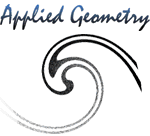This page illustrates the
progressive coding technique described in "Progressive Compression for
Lossless Transmission of Triangle Meshes" as described in Siggraph 2001
paper.
The application is one instance of an implementation
of the paper. It opens wrl 97 files containing one 2-manifold triangle
mesh, and allows the user to progressively encode it in a .vpm file (ie
"valence-based progressive mesh"), then progressively decode or decode
in full by dragging & dropping one vpm file.
Several options
are available. Resulting bit-rates are given in bits per vertex for geometry
and connectivity, and you can compare the size of the original vrml mesh
and its compressed version. The executable has been compiled for a Win32
platform (Windows 9x/NT/2000) and uses the OpenGL library. We suggest that
you take a couple of minutes to see how to tune
the encoding process on a mesh example.
Downloads
Executable
(622 KB, Windows 9x/NT/2000 application, requires OpenGL).
15
Models in vrml.zip format (3339 KB, are courtesy of Caltech, Stanford, Hugues Hoppe, and Renato Pajarola).
15
Models in compressed format (360 KB, notice the file size compared
to the vrml models encoded with winzip).
Paper
(2.4 MBytes)
Slides
(9 MBytes)
Note
The source files are not
available, and we cannot afford any additional technical support than provided
in this section. Send an email
if you have some (2-manifold triangle) meshes to convert in the adequate
format.
Important: the actual tool
contains a coarse version of a vrml parser and accepts vrml 97 files
exported via 3d studio max. Meshes must be 2-manifold triangle ones, with
arbitrary genus and boundaries.
Acknowledgments
The code was written by
Pierre
Alliez. The current implementation uses one version of the Range
Coder developed by Michael Schindler.


